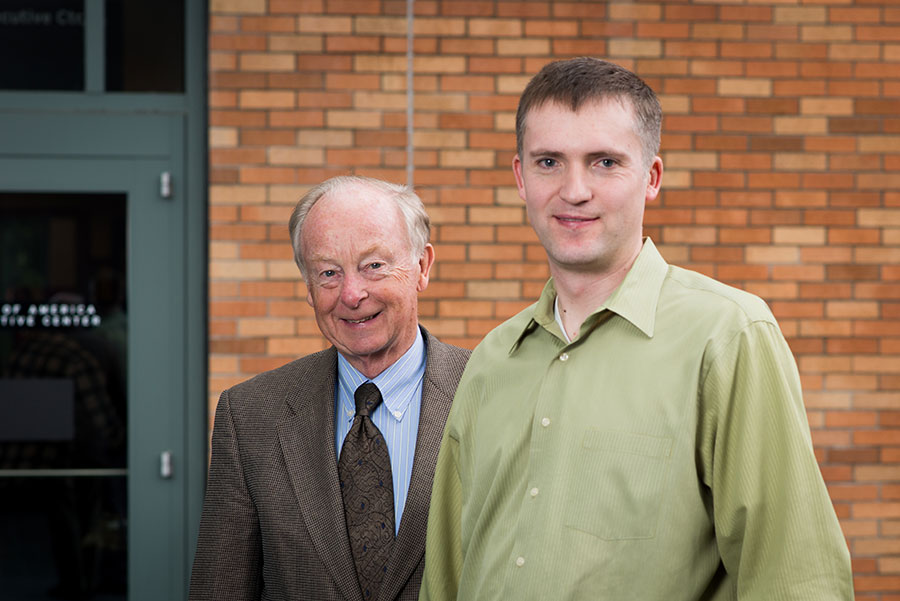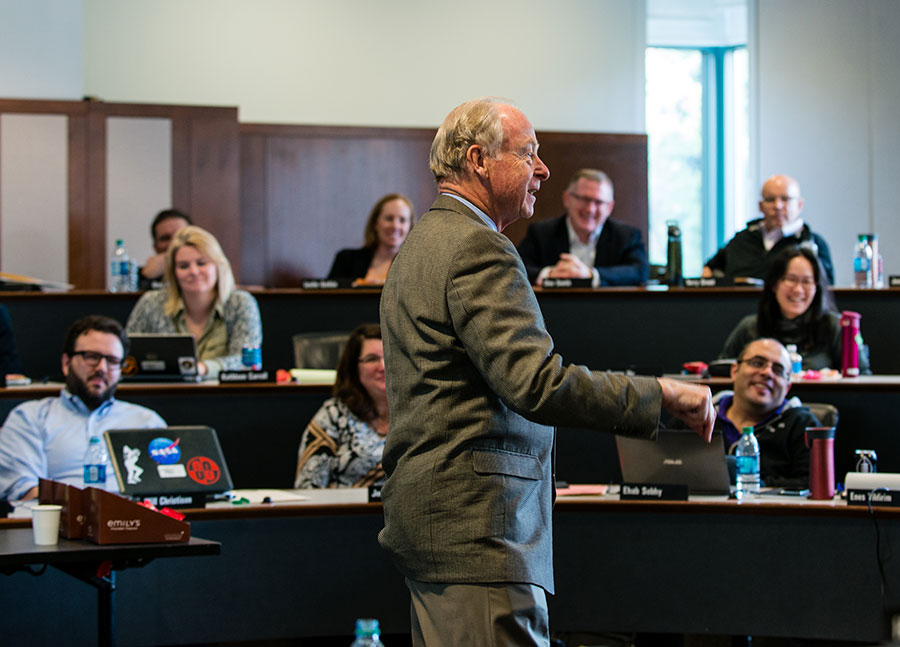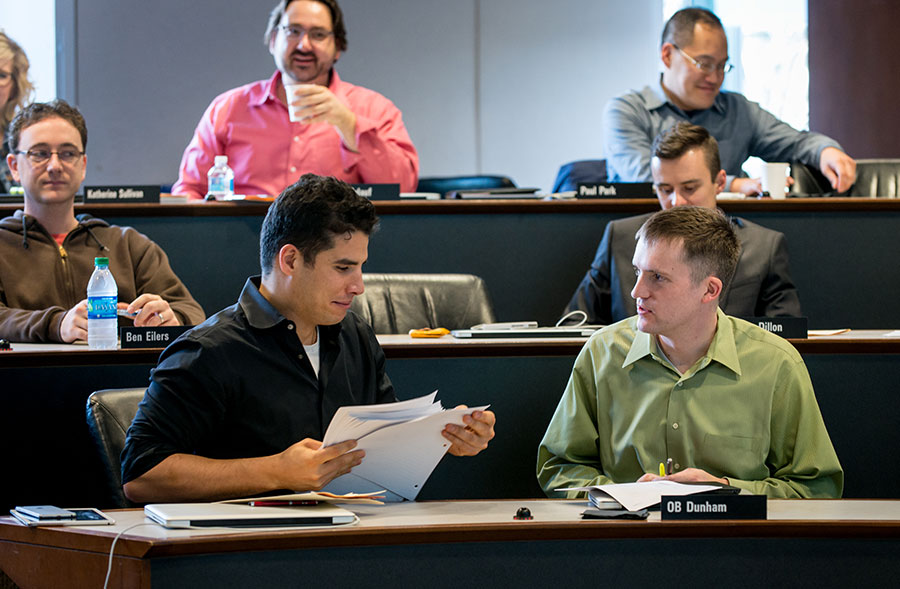Educating the educators: new fellowship to advance K-12 leadership
 What can an Executive MBA education offer a junior high school principal? In a word, leadership. That’s the impetus behind the creation of the Nielsen Fellowship, developed through a partnership between entrepreneur, philanthropist, and Foster alumnus Don Nielsen (BA 1960), and the EMBA program at the Foster School of Business.
What can an Executive MBA education offer a junior high school principal? In a word, leadership. That’s the impetus behind the creation of the Nielsen Fellowship, developed through a partnership between entrepreneur, philanthropist, and Foster alumnus Don Nielsen (BA 1960), and the EMBA program at the Foster School of Business.
The fellowship aims to improve sustained leadership in the area of K-12 education by exposing a burgeoning leader in that space to the EMBA curriculum, which emphasizes leadership development through the latest frameworks and theories as taught by top scholars in the field. “Business education provides a critically important framework for leaders in all sectors to identify and understand the current and future forces impacting their organization,” says Louise Kapustka, EMBA Program Director. “Public sector students gain insights and confidence in understanding the language of business, as well as considering the metrics and strategies employed by their for-profit colleagues,” she continues.
Nielsen’s long-standing interest in public education traces back to his time as President and Chairman of Hazelton Corporation, where he witnessed the readiness—or lack thereof—of some of his own employees. “We created a mini university inside our own business to teach what the schools didn’t,” he says. During this time he also served on education focused non-profit boards, including Junior Achievement and The Alliance for Education. After his retirement in 1992, Nielsen had more time to focus on his mission to improve public education; he served eight years on the Board of Seattle Public Schools and even became President of the Board in 2000.
 In Nielsen’s experience, public education exhibits “leadership by accident, not leadership by design.” That is to say, while leaders may arise from within the ranks of educators, many of them lack serious training in the principles of organizational management and decision making. The result is a wide variation in leadership capability from one district to the next. “If you walk into a school with an outstanding principal, you walk into an outstanding school,” he says. Through this fellowship, and similar efforts, Nielsen hopes to “select and effectively train a whole generation of leaders for our schools,” thereby instilling a standardized level of leadership excellence.
In Nielsen’s experience, public education exhibits “leadership by accident, not leadership by design.” That is to say, while leaders may arise from within the ranks of educators, many of them lack serious training in the principles of organizational management and decision making. The result is a wide variation in leadership capability from one district to the next. “If you walk into a school with an outstanding principal, you walk into an outstanding school,” he says. Through this fellowship, and similar efforts, Nielsen hopes to “select and effectively train a whole generation of leaders for our schools,” thereby instilling a standardized level of leadership excellence.
The first recipient of the Nielsen Fellowship is Obadiah Dunham, who entered the EMBA program as the principal at Leota Junior High, and has since earned a promotion to Director of Curriculum and Instruction at Northshore School District. He spent the past 16 years working in education: seven years as a science teacher, four years as an assistant principal, and five years as a principal. Coming from a small town in Idaho, where not many people went to college, Dunham knows the transformative impact even a small number of people can have on a student. In high school, his guidance counselor convinced him that he had what it takes to attend college, and he majored in science partly because of his positive relationship with one of his science teachers.
Leadership was one of the major reasons Dunham was interested in furthering his education through studying business. “That’s what intrigues me—leadership, how you work with an organization to achieve a goal,” he says. In fact, Dunham has a history of looking outside his discipline for insights on leadership. “When I looked for leadership training, I always looked into business leadership…There’s some things I’m unlikely to learn otherwise.” Thankfully, the EMBA curriculum is designed to be immediately relevant, so that lessons learned one night can be applied the next day. Having already finished a few courses on leadership Dunham says, “There’s been some really good things I’ve pulled out of this, when it comes to decision making.”
 But, it’s not just Dunham who’s benefiting from the Nielsen Fellowship. His study team and the entire EMBA class benefits from his added perspective. “An important quality metric for EMBA program cohorts is the breadth and depth of the industries and experiences represented in the classroom, says Kapustka. “Students’ perspectives and insights are made richer by hearing about organizations and industries different than their own,” she continues. Nielsen himself intended as much: “I’m hopeful that one or two [of Dunham’s] classmates will become interested in public education or public service.”
But, it’s not just Dunham who’s benefiting from the Nielsen Fellowship. His study team and the entire EMBA class benefits from his added perspective. “An important quality metric for EMBA program cohorts is the breadth and depth of the industries and experiences represented in the classroom, says Kapustka. “Students’ perspectives and insights are made richer by hearing about organizations and industries different than their own,” she continues. Nielsen himself intended as much: “I’m hopeful that one or two [of Dunham’s] classmates will become interested in public education or public service.”
Kapustka considers the Nielsen Fellowship an excellent case of leading by example. “Don and Melissa Nielsen are passionate about the challenges, importance, and impact of leadership on education. Their fellowship is truly an investment in the future efficacy of the US education system,” she says.
